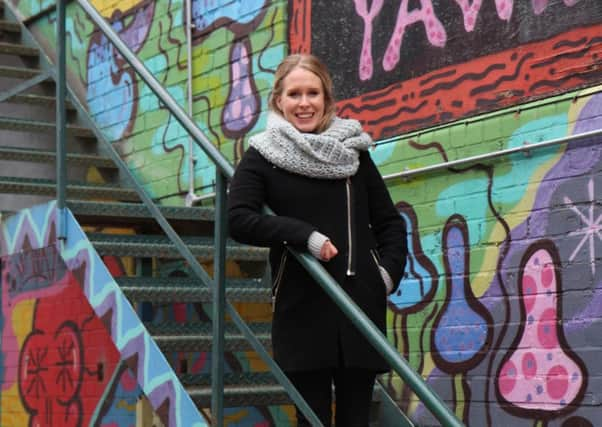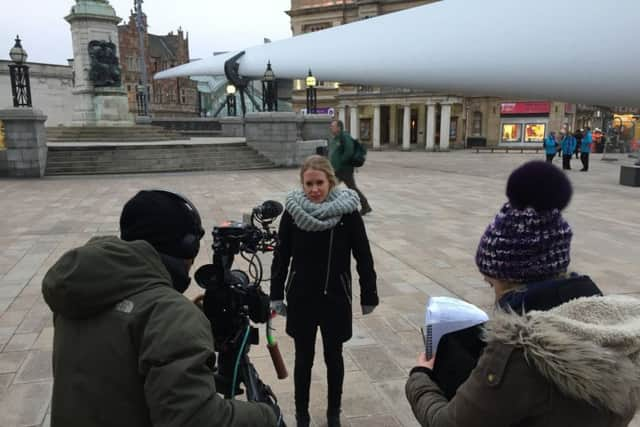Comedian Lucy Beaumont on why Hull deserves to be taken seriously


Lucy Beaumont has just spent the afternoon exploring Philip Larkin’s office at Hull University. Before that she had been chatting to Richard Bean about the world premiere of his new play The Hypocrite and she also squeezed in a look round the city’s recently reopened Ferens Art Gallery after its £5m revamp. For the comedian and writer who draws much of her material from her home city, making a documentary about the impact of UK City of Culture is having on the place was an offer too good to turn down.
While the nature of the comedy business meant Beaumont moved to London a few years ago, she has always been fiercely proud of the place and like a proud elder sister has watched it embrace its status as UK City of Culture for 2017.
Advertisement
Hide AdAdvertisement
Hide Ad“The BBC wanted to make a documentary about what was happening in Hull, how it is stepping out of the shadows, but they wanted it to be from the personal perspective from someone who grew up there, someone for whom those streets still mean a lot,” says Beaumont, whose Radio 4 comedy series To Hull and Back stars another of the city’s famous daughters, Maureen Lipman. “Ten years ago it felt like Hull was 10 years behind everywhere else. The population was declining, there’s no point denying it, people wanted to get out. I wanted to go get out.”


Beaumont’s own rise to success in the last decade neatly mirrors Hull’s renaissance. After studying drama at Hull University, she was up for a tour with Northern Broadsides. However, when that fell through she ended up cleaning back at the university. As the acting jobs came and went, Beaumont picked up jobs where she could, including once giving out 2,500 chunks of cheese in supermarket carparks.
While the acting never worked out, she eventually decided to indulge her natural talent for comedy. In 2012 it resulted in her winning the BBC Radio 2 New Comedy Awards and securing that Radio 4 commission. Four years on, her career, a bit like Hull, has blossomed.
“It’s lovely coming back and seeing how optimistic the city feels right now, just look at the Fruit Market” she says, referring to the old fruit and veg wholesalers which had been earmarked for demolition. When the recession bit, the redevelopment plans were put on hold and it has instead reinvented itself as something of a creative hub.
Advertisement
Hide AdAdvertisement
Hide Ad“When I was growing up you couldn’t even get a coffee there, now it’s like a mini Greenwich Village. Hull now has a council it deserves, one that recognises the importance of the arts and the creative community.


“Those people have always been there, but now they have a platform to really make an impact. Somehow they have created an atmosphere where things feel possible and that’s important. It means that the university students don’t leave as soon as they’ve graduated. Instead they stay and make their mark.”
While Beaumont, who married fellow comedian Jon Richardson in 2015, may live in London, part of her never left Hull. Keen to share the love, it’s why she agreed to do the documentary even though it meant juggling the demands of four-month-old daughter Elsie with a hectic filming schedule.
“The difference is obvious as soon as you step off the train. We are finally finding what makes us different and that we can be attractive to the rest of the nation and really believe in ourselves.
Advertisement
Hide AdAdvertisement
Hide Ad“I’ve always been really proud to say I was from Hull, but we have been guilty of being our own worst critics. While no one else was allowed to say we were rubbish, we never tired of saying it. And we said it so much that for a while we ended up believing that Hull didn’t have much to offer anyone.
“But the opposite is true. This is a place with a really rich history. It played a key part in the English Civil War and then it grew into this hugely important port town. Hull was affluent, it had amazing architecture and it was place that other cities envied.”
The tide from opulence to poverty began to turn during the Second World War. At the end of the conflict Hull had the unfortunate claim to fame of being the second most bombed city in the country. While Coventry got all the sympathy and all the money to rebuild, Hull was cut adrift and as result, perhaps understandably, it became inward-looking.
“The damage caused by the bombing wasn’t reported in the national Press and I think that was really the start of the city’s isolation,” says Beaumont. “It was compounded in the 1970s when the bottom fell out of Britain’s fishing industry. Thousands of people here relied on it for work and then all of a sudden it was gone and there was nothing to replace it. Hull was on its knees, but there was worse to come. When the recession of the 80s hit, it snuffed out any hope people had that there would be better times around the corner. We just got used to no work.”
Advertisement
Hide AdAdvertisement
Hide AdIn fact Hull became a byword for a deprivation and, as it topped the annual list of Crap Towns, for a while it seemed that the city would forever be the butt of a particularly cruel joke.
“If it wasn’t Hull, it was Morecambe or Grimsby,” says Beaumont. “I always found it sad because each one of those towns or cities had lost an industry. It wasn’t their fault, they were a victim of circumstance. But if the story of Hull shows people anything, it shows that it doesn’t have to be that way. What they have done at the Ferens is brilliant, but nurturing the arts doesn’t always require a multi-million pound budget. Sometimes it can be as simple as giving an empty shop over to an artist who can turn it into a pop up gallery. There’s always been so much talent here, but until now it’s always been a struggle to make a living out of being creative.”
Beaumont speaks from experience. Her mother, the playwright Gill Adams struggled for years to get recognition and every time it looked like her career was about to take off, it stalled.
“Mum always kept writing, but it was hard as a single parent and I just hope that she can benefit from what’s happening in Hull. She’s currently in rehearsals at the moment, reviving one of the first plays she ever wrote called Fish n’ Leather. I popped in while I was making the documentary and I think everyone is hoping that there is some substance to the Northern Powerhouse because art alone can’t make a city thrive.
Advertisement
Hide AdAdvertisement
Hide Ad“We’ve got the Siemens wind turbine factor which is great and we’ve got the pharmaceutical industry and now we need to take that next step. I want Hull to become a proper European destination and I don’t see why it can’t be. We take people on the ferry from here to Amsterdam, so we should be able to bring a few of them back here.”
While she may have started off on the stand-up circuit, Beaumont now plans to concentrate on writing and she also has another long-term mission.
“I had to move to London at the start of my career, but my dream is to work my way back to Hull and I’m getting there. The plan is to move to Hebden Bridge, then Beverley, and I will probably be ready to move back to Hull just as the house prices have shot through the roof and I’ve been priced out of the market.”
Welcome to Hull – City of Culture 2017 presented by Lucy Beaumont will broadcast on BBC Two this month.